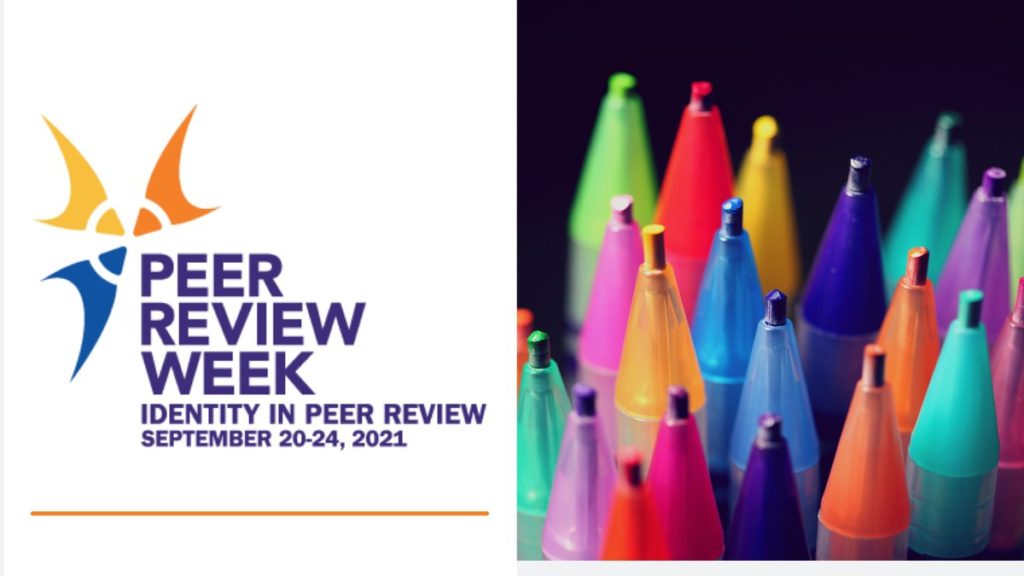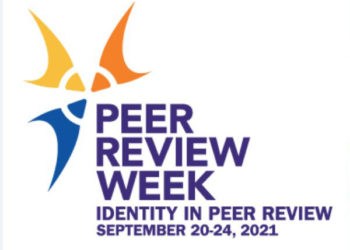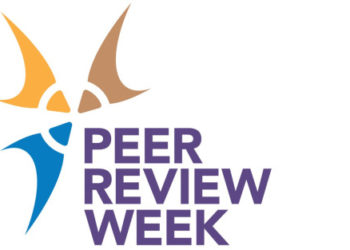Editor’s note: As an echo of the Ask the Chefs post yesterday, this post was compiled by Danielle Padula and Jayashree Rajagopalan. Danielle heads up marketing and community development at Scholastica, a scholarly publishing technology provider with peer review, production, and open access journal hosting solutions. Prior to joining Scholastica, Danielle worked in academic book publishing. She is co-chairing Peer Review Week for 2021. Jayashree (MA, ELS) is Senior Manager, Global Community Engagement at Cactus Communications, where she oversees R Voice – a community forum for researchers globally. She has been part of the scholarly communication industry for over a decade, playing various roles that helped her learn more about researchers’ aspirations, needs, and the struggles they face while navigating their unique academic and publication journeys. Jayashree is co-chair of Peer Review Week 2021.
Quality peer review is foundational to the advancement of scholarship, and it depends on one thing — people.
The theme of this Peer Review Week (September 20-24, 2021), “Identity,” puts a spotlight on the people behind the process. We’re taking the time to celebrate the contributions of the myriad stakeholders involved in research assessment, consider the impacts of peer review on all influenced by it — from authors to readers — and talk about ways to make peer review practices more diverse, equitable, and inclusive.
What better way to explore identity in peer review than to ask individuals to share their perceptions and experiences?
To springboard discussion and introduce some of the diverse volunteers involved in Peer Review Week 2021, we asked members of the steering committee to respond to the prompt: What does identity in peer review mean to you?
Below is what they had to say. Thanks to The Scholarly Kitchen for hosting this roundup!

Gareth Dyke, Author Education Manager, Edanz
For me, identity in peer review has to do with whether authors and reviewers are aware of each other’s ‘identities’. To anonymize, or not to anonymize, in other words. We know that lots of colleagues in the ‘developing world’ (whatever that means) prefer to have their articles reviewed anonymously: for their identities not to be revealed to reviewers. I have experienced this in my own career, as I hope to discuss in this event – reviewers look at countries where work is being done and make decisions early, based on these observations. So, we can increase diversity and fairness in peer review by being more open and inclusive and giving authors more choice in HOW their papers are assessed?
Simon Linacre, Marketing Director, Cabells
For me, Peer Review Week is an annual opportunity for the industry to try to improve peer review with the help of those who use the process — academic researchers. The more we can engage as an industry with them, the more we will learn and improve the overall system. This year’s topic of ‘Identity in Peer Review’ is therefore especially important as it is an issue that has almost been taboo in the past for all sorts of reasons, and as a result authors’ and peer reviewers’ voices have struggled to be heard. This year’s theme will hopefully provide a platform for these voices, and for publishers to listen and respond.
Michael WIllis, Researcher Advocate, Wiley
The pursuit of knowledge and expansion of our understanding of the world demand a diversity of perspectives. For example, healthcare provision in one population group may not be applicable in another group. The perspective of a junior scientist in one country may differ significantly from that of a senior researcher in another – and both perspectives will be valid. At Wiley we continue to focus on driving greater inclusivity in research publishing, and peer review plays an essential role in this ecosystem. This year’s Peer Review Week theme of ‘Identity’ underlines publishers’ attention to the individuals who play a key role in communicating and improving the quality of research. It will help us continue to examine how identity influences peer review and can contribute to improving the research process.
Annette Windhorn, External Communications Manager, Association of University Presses
Rigorous editorial standards and ethical peer review practices are central to the mission of university press work. For the Association of University Presses (AUPresses), the practice of peer review reflects our core values of integrity in scholarship and stewardship of knowledge, supports intellectual freedom, and must be fully engaged with a commitment to equity, diversity, inclusion, and justice.
Identity is central to peer review, whether looking at differing disciplinary norms around anonymity or interrogating the question of “who is a peer?” The community members who authored our 2020 “Statement on Equity and Anti-Racism” challenged the university press community to reflect on that second aspect of peer review by “[reimagining] the author and reviewer networks that we rely on,” acknowledging that this work “requires introspection, honesty, and reform of our current practices, the interests they serve, and the people and perspectives they exclude.”
Several AUPresses Committees have taken up that challenge:
The AUPresses Acquisitions Editorial Committee is working to update its handbook on scholarly books’ Best Practices for Peer Review (2016). A primary intention for this second edition is to model increasing inclusivity and attention to equity in these essential practices.
The AUPresses 2021 Annual Meeting Program Committee designed several sessions in response to our call towards antiracism — including “The Change We Wish to See: Acquiring Editors as Agents of Transformation,” “Meeting the Needs of BIPOC Authors,” and a plenary presentation on neurodiversity by autistic activist Jorik Mol — for last June’s conference.
The AUPresses Equity, Justice, and Inclusion Committee is leading a pilot program with more than 30 presses in the US, Canada, and the UK to develop a tool to ethically track voluntarily provided demographic data about publishing partners — importantly, authors and reviewers, though presses may also request participation from editorial boards, vendors, and others — that will enable presses to measure the progress of their diversity, equity, and inclusion efforts.
With thousands of people engaged in the intellectual (and emotional) labor of peer review, the attention to identity in its practice is vital to a more equitable and more just scholarly publishing community. The work that our university press community is putting into the projects outlined above, and more that will and must be undertaken, reflects our hope for and commitment to that future.
Dr. Jayanthiny Kangatharan, Research acoustician and the UK representative for the Young Acoustics Network at the European Acoustics Association
This year’s Peer Review Week’s theme is identity. What is identity? Identity is who we are. We are individuals who live at different levels, such as at the personal level, the professional level, the social level, the cultural level, and any other level. We might think that we use these different identities to connect with each other, for example, in our roles as an employee, a friend, a parent, a brother, a colleague. However, the truth is that it is through the diversity of our experiences and insights into life that we are able to connect with each other because at the spiritual level we are all one.
It is only by recognizing diversity that we can start celebrating humanity. When we acknowledge ourselves as who we truly are at the human level, we can promote peer review practices with inclusivity and equity and we can overcome any obstacle that might come our way.
When we work through the process of peer review in a collaborative way, this is actually the moment when our identities, and our different backgrounds merge and we become one because peer review allows us all to come together in our shared aim to ensure high-quality research.
Recent events have shone light onto and emphasized our shared identity as human beings and we need to ensure that throughout Peer Review Week 2021 and beyond we develop a higher awareness as human souls for us to grow as authors and peer reviewers so that regardless of our earthly backgrounds, yes, we can express and show generosity, care, kindness, consideration and understanding as authors, peer reviewers, journal editors, publishers and readers.
Sneha Kulkarni, Editor-in-Chief, Editage Insights
For me, identity in peer review means acknowledging the interplay between personal and professional identity in the peer review process. There’s no denying that each one of us has a unique identity and it has a huge impact on everything we do. But does this mean that these subjective identities interfere in the process of scholarly communication? To be specific, does the interplay of different identities in the scholarly publishing workflow make essential steps like peer review less objective? Though this may sound contradictory, only by embracing these identities can we hope to make peer review more objective, rounded, and robust. Accepting the uniqueness each of us bring to scholarly communication will provide opportunities to look at the same concept from different vantage points. Maybe we’ll disagree with some views and agree with others, but we will look in a direction someone else is pointing to. Identity in peer review, thus, is bravely inviting and celebrating diverse voices, viewpoints, and thought processes and ultimately enriching our own identity.
Bahar Mehmani, PhD, Reviewer Experience Lead, Elsevier
The peer review process is organized, managed, and performed by human beings — i.e., academics with different roles as editorial staff, scientific editors, and external peer reviewers. It is also centered on a manuscript that is written by academics in their author role. Each of these role-players individually identify themselves as expert, experienced/young, women/man/non-binary, have an affiliation that is part of their academic identity. On top of this they also identify with a certain nationality, ethnicity, and social group. This whole package and how it impacts editorial and peer review decision making process means “Identity in Peer Review” to me.
Rohit Goswami, Doctoral Researcher at the University of Iceland and Software Engineer at Quansight Labs
Identity in Peer review to me means responsibility. The peer review process is integral to the academic process, and accountability suffers far too often due to a misguided sense of superiority or snap judgements. Identity in peer review means, paradoxically, stepping back from the sense of self and reviewing work through the lens of scientific merit only. At the same time, consciousness of different cultures and contexts have entered the scientific community and it is important to be cognizant of the same while working on prospective reviews. This means an emphasis on compassion in the reviewing process.
Jennifer Mahar, ISMTE PRW representative
Identity in Peer Review means a lot to me. I’ve actually reflected on my own identification in our community over the past 25 years. My evolution of identity throughout my career has been something that I’ve been slow to uptake but am getting more comfortable in this role. I have realized it’s time to give back at this time in my career, this self-identification has helped me to realize there is work to be done and that I have a place in our community. And for that I am so grateful and happy to identify myself as a member of Peer Review Week, ISMTE and our Publishing Community at large. I can’t wait to see where the future will take us!
Duncan Nicholas, Director, DN Journals / President, EASE
Identity in peer review means two different things to me. One is our personal identities, and the way we would like to present ourselves to the world, in a professional capacity and the ways in which we can develop this identity. Second are the group identities that make up all the different demographics, audiences, communities and other groups within the research and publishing worlds.
Our personal identities can be developed by choosing how we present our titles, accolades, and metrics, through platforms such as academic-related, ORCID, Publons, through more socially-oriented profiles on ResearchGate, through to more public-facing sites such as Twitter, LinkedIn, Facebook. We can create different identities, and adapt to use all of these to their fullest potential to reflect our various characteristics, talk to audiences in appropriate ways, demonstrate our value, abilities – and identity – within our communities.
Group identities and demographics are of great importance to understand, so that we can serve those communities with relevant information, communicate in relevant ways, and adapt our actions in response to what we aim to achieve. It is important for people to be recognized, represented, and acknowledged, so that we can enhance our understanding and implications of our activities.
For example, in peer review – do we only ever ask white, North American men to review papers? What insights are we missing out on by not asking any other ethnicities from the rest of the world? Does this end up biasing and skewing our understanding of the world, so that we only create interventions to problems that serve that one demographic? Similarly, are we only receiving research from a certain demographic, that can result in the same problems?
It is vital to understand group identities as an extension and expansion from our individual identities, and continue to progress to more equitable systems and more nuanced appreciation of the networks we are part of.
Join the conversation!
We invite all members of the scholarly community to share what identity in peer review means to them using this year’s hashtags #PeerReviewWeek21 and #IdentityInPeerReview.



